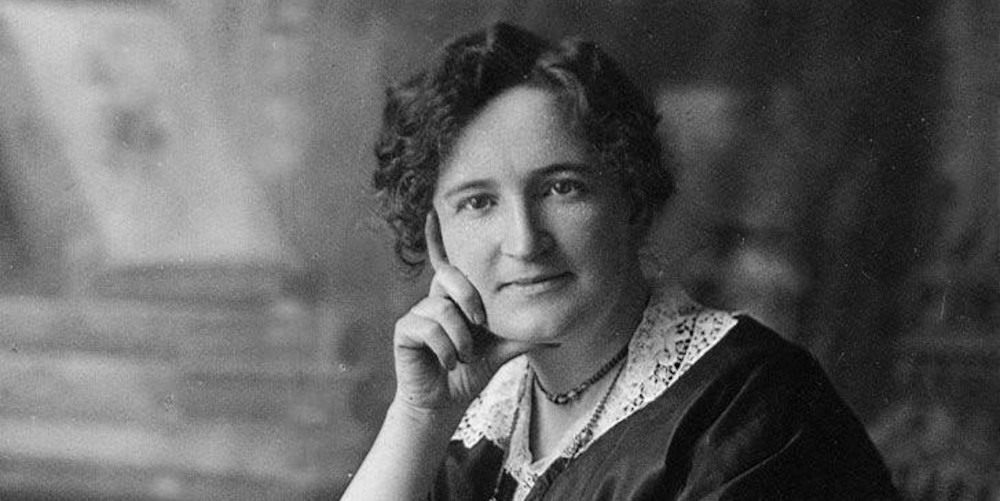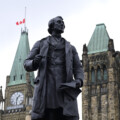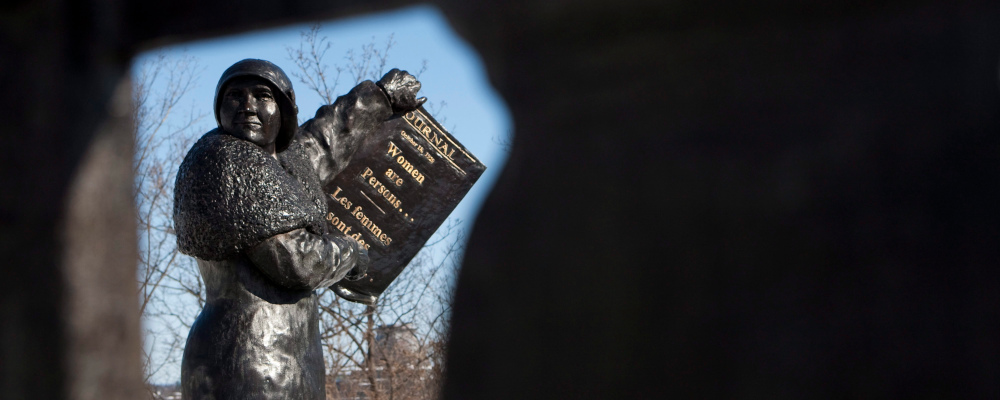The Hub is pleased to present a weekly column from author and historian Antony Anderson on the week that was in Canadian history.
April 1928: The Supreme Court of Canada declares that women are not persons
She had heard this kind of thing her entire life: a chorus of pampered male voices laying out the limits of what she and every other woman in Canada would be allowed. Nellie McClung, suffragette, journalist, reformer (i.e. disturber par excellence), had joined four other potential persons to petition the Supreme Court to rule on whether women could, in 1928, be appointed to the Senate.
Section 24 of the British North America Act, crafted in 1867, stated that only “properly qualified persons” were fit for such splendour. It was assumed that “qualified persons” meant just the males of the species. After due deliberation, the justices of the Supreme Court—all men—agreed that Canada should abide by the assumptions of 1867 and continue to keep women out of the Red Chamber. That April 24 decision was infuriating but nothing new to McClung. She had spent decades howling at things that almost everyone else took for granted.
Her father had immigrated from Ireland, her mother from Scotland, staunch Methodists, in search of something more. Their separate paths joined in Ontario, where McClung was born in 1873 on the edge of the Bruce Peninsula near the town of Chatsworth. They found themselves, as historian Charlotte Gray writes, “scraping a threadbare existence from…cramped and stony fields”. Their optimism trumping experience, they headed west in 1880, to Manitoba, raising six children on a homestead southwest of Portage la Prairie.

This was a cloistered, hand-made world grounded in self-reliance and faith; a physically hard life that did not harden McClung’s heart for she was blessed with empathy, a delight in life, endless curiosity, and surreal amounts of energy. She had no intention of fulfilling anyone’s expectations except her own and those of her Maker, as she was able to conceive them. In a childhood without movies, radio, phonographs, or telephones, she lost herself in the power of the word, experiencing an almost born-again rapture reading Charles Dickens:
I knew in that radiance what a writer can be at his best, an interpreter, a revealer of secrets, a heavenly surgeon, a sculptor who can bring an angel out of the stone. And I wanted to write; to do for the people around me what Dickens had done for his people. I wanted to be a voice for the voiceless as he had been a defender of the weak, a flaming fire that would consume the dross that encrusts human souls, a spring of sweet water beating up through all this bitter world to refresh and our souls that were ready to faint.
Heady stuff but this would all come to pass; indeed, she made it so.
To her mother’s consternation, McClung showed no interest in the early marriage trap and became a teacher, still something of a child herself, at age 16. In 1890, she was dispatched to the town of Hazel, a whole new world, to wrangle eight grades in a single-room schoolhouse. Deeply devout, the child teacher attended Sunday Bible classes for young ladies, taught by the minister’s wife. Young Nellie seems to have undergone yet another rapture over the, as she gushed later over a, “strikingly handsome…beautifully dressed” creature from another realm. “When looking into her eyes I saw the browns and greens and gold of the moss in the meadow brook at home when the sunshine fell into its clear stream.” Nellie even told a friend that the minister’s wife “is the only woman I have ever seen whom I would like to have for a mother-in-law.” And once again, Nellie would make it so.
The minister’s wife, Annie McClung, was a dose of the future, dazzling Nellie with her “fearless, and even radical, mind,” by the fact that she believed in women having the vote, by daring to circulate a petition supporting this move, and by raising her sons to do their share of the banal chores at home just like their sister. In 1892, Nellie was posted to the nearby town of Manitou, and as fate and perhaps some backstage manoeuvring would have it, found herself boarding with the divine Mrs. McClung and family. The eldest son, Wesley, soft-spoken, bright, a pharmacist by trade, was a man ahead of his time and wanted a wife as remarkable as his mother. Nellie realised this: “I would not need to lay side my ambition if I married him. He would not want me to devote my whole life to him, he often said so.” They had five children and would be married for almost 55 years of joy and sorrow, sickness and health, better and worse, parted only by death.
In the midst of raising her family, McClung made time to remake the world as she could. Her faith was steeped in Methodism’s “Social Gospel” which set out to undo the evils of the industrial marketplace right now rather than wait for justice in the afterlife. McClung flung herself into a multitude of organisations, the most prominent being the Woman’s Christian Temperance Union which wanted to ban alcohol, the devil trigger of spousal and child abuse and endless other sins.
In 1907, she ventured as a first-time delegate to address a WCTU convention. It seems she surprised even herself by how riveting she was. “I saw faces brighten, eyes glisten, and felt the atmosphere crackle with a new power. I saw what could be done with words, for I had the vision of a new world as I talked.”
A year later, she would see her first novel published, Sowing Seeds in Danny about the trials and comedies of a young woman growing up on the prairies. Once again, her mother-in-law played a decisive role, interrupting McClung in the middle of doing the weekly washing to insist she enter a short story contest for a major American magazine. McClung began to list all the chores and duties that demanded her attention. The incredible Annie McClung looked at her daughter-in-law and said, “Trifles—all of them. If you wait until you are ready to write, you will never write. Don’t you know that conditions are never perfect? Life conspires to keep a woman tangled in trifles.” Nellie was ordered out of the kitchen.
By that evening, she had finished a draft. She eventually received a glowing rejection letter and liking what she’d done, turned her initial idea into a novel, which became a best-seller. She never stopped writing; she produced 17 books in all, including her autobiography, novels, and collections of opinion pieces infused with her charm and wit. She was never a grouchy activist. Naturally, that wasn’t enough for her. There was still too much sin in the world to retreat into mere worldly success.

In 1911, she and the family moved to Winnipeg where she continued her campaigns for prohibition and the vote in print and on public platforms. In 1916, Manitoba became the first province to allow women the privilege of casting a ballot. This breakthrough, however welcome, was just one battle in a vast campaign, as McClung wrote, “Women are enfranchised but not emancipated.” She pushed her beloved Methodist Church to ordain women and allow their appointment to the church’s governing bodies.
She was appalled by the immoral work conditions inflicted upon the working poor. One of her friends happened to know the premier, Sir Rodmond Roblin, and they beguiled him—they were young and attractive, he was elderly and patronising—into visiting a sweatshop. McClung took note of his expensive beaver coat, the chauffeured car, “his plump hands resting on a gold-headed cane” and listened on the drive as he mansplained at length about the sins of wanton female idleness and opined that factory work would keep these women off the street and allow some them some fun money.
Then McClung and her friend took him down dark steps into a basement underworld without air, pounding with noise, a filthy floor sticky with garbage, women hunched over sewing machines, lining up for one toilet with blocked plumbing. McClung quite literally pushed the delicate premier along from behind to keep him moving through the squalor. “For God’s sake,” he begged, “Let me out of here. I’m choking. I never knew such hell holes existed.” No kidding. “I still can’t see why two women like you should ferret out such utterly disgusting things.” But that was when McClung was at her best, making life squeamish for the complacent.
Even Nellie McClung, of course, had her limitations. She advocated awful bits of eugenic thinking. She was not alone in this.
In 1921, now living in Alberta, she ran as a Liberal MLA in Edmonton, won, and acted like an independent, supporting her opponents when she felt they were doing something sensible. She was defeated in 1926 because she had pushed so hard for prohibition.
Then there was the Person’s Case, spearheaded by Canada’s and indeed the British Empire’s first female judge, Emily Murphy, joined by three other stellar figures, Henrietta Muir Edwards, Louise McKinney (an Alberta MLA, the first woman elected to a legislature in the British Empire), and Irene Parlby (Alberta MLA). When the Supreme Court of Canada, in all its wisdom, preferred to think it was still 1867, the Famous Five, as they came to be called, used their last resort and appealed, as was their right as British subjects, to Britain’s Judicial Committee of the Privy Council. Those men across the ocean overruled Canada’s Supreme Court, which wasn’t so supreme, on October 18, 1929, and declared that women could and should be deemed “qualified persons” and thus eligible to be admitted to the Senate.
It was a landmark triumph, but again for McClung, just another overdue marker on the long road to social justice. In the mid-1930s through the Second World War, by then living in Victoria, B.C., she railed against anti-Asian racism, an especially brave stance after Japan had bombed Pearl Harbor, urging her fellow Canadians not to hate their fellow Canadians because of the colour of their skin, “We must not sink into Hitler’s ways of persecution. We must not punish innocent people.”
Nellie McClung amplified existing currents and spread necessary ideas further than they would have reached with more punch than most of her contemporaries could manage. Only students of Canadian literature still read her novels but that doesn’t matter. She acknowledged that “If some of my stories are…sermons in disguise, my earnest hope is that the disguise did not obscure the sermon.” They did not. The sermons worked their wonders.
Recommended for You

Canadians lost confidence in Parliament at end of Justin Trudeau’s prime ministership: Statistics Canada

‘All risk and no reward’: The Roundtable on why Carney’s China trip is a really big deal

Mark Carney’s spelling and the ghost of Sir John A. Macdonald

Harper was right—Canadian foreign policy should prioritize the Americas: The Weekly Wrap




